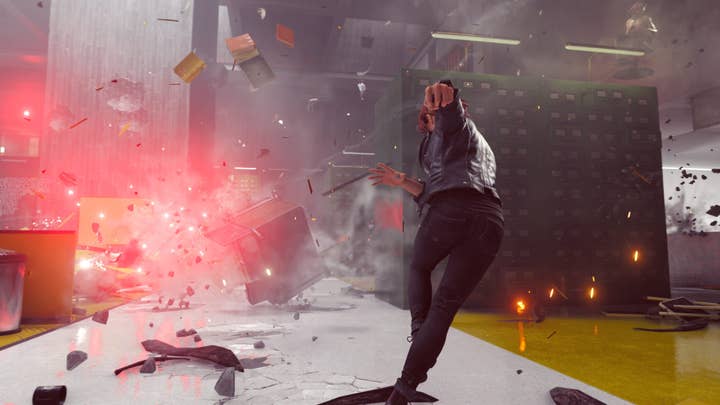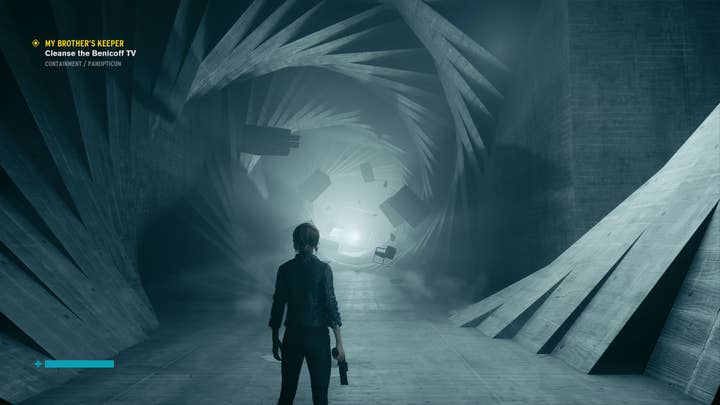Control: Critical Consensus
Critics rave as Remedy's bizarre supernatural third-person shooter shows the studio "has reached its final form"
"Control continues the basic formula that Remedy Entertainment has been playing with for all these years -- third-person action with a hint of unreality -- but it feels like the studio has reached its final form."
That's a snippet of Mike Williams' summary paragraph from his USgamer review of Control, which he gave four out of five stars. While the "final form" phrasing was distinctly his own, the sentiment behind it was one we saw repeatedly while surveying the assortment of reviews published Monday for Control.
Like the studio's Alan Wake and Quantum Break, Control has an ambitious narrative bent that sets it apart from the AAA crowd, even if the gameplay tends to rest on some tried-and-true concepts.
In Control, players take the role of Jesse Faden, the newest employee of the Federal Bureau of Control, a government agency focused on the supernatural. The FBC's office is The Oldest House, an impossible building whose layout and obedience to basic laws of physics are frequently shifting. But no sooner has Faden entered the scene than everything at The Oldest House goes haywire -- more so than usual -- and she tries her best to survive the chaos and make sense of the situation, often through third-person shooter combat.
As Edwin Evans-Thirlwell wrote in Video Games Chronicle's 4 out of 5 stars review, "Stewed in a fondness for eerie Americana built up through games like Max Payne and Alan Wake, it can be triumphantly bizarre. But so much of the game's design, and so much of Jesse's purpose within its story, is about reining in the concept and reducing everything to the cleanness and clearness of a third-person shooter."
Christian Donlan supported that assessment in giving the game a "Recommended" nod from Eurogamer, calling it "an obligingly straight-ahead blaster mounted in the most ornate of frames."
For some reviewers, this was a mark against the game. In reviewing the game for The Verge, Andrew Webster said the game's reliance on cover-based shooter tropes can make it drag.
"The problem is that the game relies too much on combat," Webster said. "Often, enemies would respawn seemingly at random, and I'd be forced to replay simple but tedious combat scenarios multiple times. This discouraged exploration. You can get around the battles somewhat with Control's fast-travel feature, though, of course, that isn't really exploring at all. Worse still are some of the boss-like battles, which seem downright unfair, throwing wave after wave of bad guys at you. It's a frustrating way to slow your progress, and there were times - particularly one egregiously long battle toward the end of the game - where I almost gave up on Control because I didn't want to replay the same fight for the dozenth time."
Even so, Webster stressed "it's worth pushing through to see the uniquely uncomfortable world Remedy has created."
Other reviewers had fewer misgivings about the combat. In an 8.8 out of 10 review for IGN, Jonathon Dornbush praised the psychic combat abilities that are a key part of the game's fighting, in particular a telekinetic ability called "Launch" that lets players pummel enemies with anything in the environment not nailed down.
"While it's not quite the same level of tactile satisfaction as Kratos' Leviathan axe in God of War, the oomph of hurling heavy objects around with my mind is as close as I've felt since," Dornbush said.

And even though Donlan had had plenty of praise for the Launch ability (and the joy of eliminating enemies by throwing armchairs, photocopiers, and various bits of old, heavy technology at them), he acknowledged how the straight-forward nature of the combat stands in contrast to the story.
"There's a little trickery in the narrative some of the time, but Control refuses to descend into all-out mechanical weirdness for the most part. It never forgets the pleasure of being a shooter above all other things, and with a few exceptions it's more eager to hit you full-on with architectural beauty than warp your brain with the kind of spatial shenanigans you get in something like Portal."
A number of reviewers also noted the game's somewhat open structure, where backtracking is required and new abilities will help open up previously inaccessible parts of The Oldest House.
"This isn't the kind of experience that pushes you in any one particular direction," Webster said. "There are no big glowing arrows showing you where to go and the mini-map is pretty hard to use. I found myself getting lost a lot, particularly early on, as I stumbled through the confusingly maze-like structure of the Oldest House. But it also felt appropriate. At the beginning, Jesse is a newcomer to this world... You learn alongside her, and it's very rewarding."
GameSpot's Peter Brown said that structure also helps give the game a bit of longevity in his 8 out of 10 review, as Remedy filled Control with side quests and things that could be easily missed on an initial playthrough. What's more, the world Remedy created makes those extra bits more than just busywork.
"It's not often that a game invades my thoughts the way Control has," Brown said. "I'm at the point where I want to consume every last thing it has to offer. And if I'm honest, it also makes me want to go back and replay Remedy's past games, too. Sure, it's a faulty Metroidvania in some respects, but there are so many exceptional qualities afoot that Control handily deflects any momentary ire. I can't wait to take part in discussions about the game, to see what others have figured out, and to better understand where it all fits into Jesse's story."


